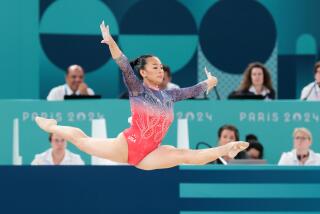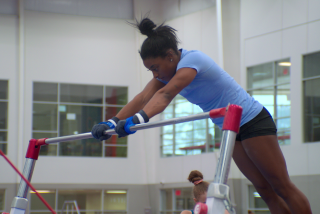Underage but Hardly Overmatched : Biathlete: Karrie King, 19, has made a speedy ascent in a sport dominated by women in their 20s and 30s.
- Share via
Karrie King of Northridge is a rarity on the Coors Light Biathlon Series pro tour: She’s the only competitor to crack the women’s top 10 who is too young to drink the sponsor’s product.
King is but 19, a mere child in a sport where the average woman pro is 28 and the reigning champion, Liz Downing of Portland, is 30. But she’s been able to keep up with the big girls. Last month, King--the only teen-ager in the field of 22--finished sixth in the Coors Light National Championships in Phoenix.
Because of the sport’s endurance factor--a 30K bicycle ride sandwiched between two 5K runs--it usually takes years to develop into a world-class biathlete, but King has managed to do it in sightly more than one. Which is a surprise to her as well as her old high school friends.
“No way did I expect to be a pro athlete,” says King, who won $1,000 in Phoenix.
At Granada Hills High, the 5-foot-4 blonde would not have been voted most likely to become the teen queen of the biathlon. She ran track and cross-country, but her biggest accomplishment was a fourth-place finish in the city 800 meters her junior year. Everybody knew her main interest was the social scene.
“She was a total flake the first two years she ran for me,” says Bob Augello, former assistant track coach at Granada Hills. “She’d train and be an animal for two weeks, then disappear, come back, say she’s fat, not into it, then train like an animal for two more weeks before disappearing again. There are a lot of distractions in high school, especially for a vibrant person like Karrie.”
King didn’t have a chance to be a flake her senior year. A skiing accident at Mountain High caused a stress fracture of the femur in her right leg. She had to be on crutches for six months, missing her senior year of track and finally shedding the crutches the day before graduation. To get back in shape, she used a Spin Coach Turbo Trainer, a device that enables a serious cyclist to train indoors by converting a 10-speed to a stationary bike.
Augello had introduced King and other Granada Hills runners to cycling in 1986. They bought bikes and spent the summer cycling and running. In their junior year, Augello got them involved with cycling at the Encino Velodrome as a way to improve their running endurance.
Only three months after she discarded her crutches, Augello entered King and a few of his male runners in a small biathlon in Big Bear. King amazed everybody by finishing second behind Sue Griesbach of Fullerton. Considering her convalescence, King was stronger than expected in the 5K runs but finished seven minutes behind Griesbach in the bike segment.
After she won a couple of small L. A. biathlons, Augello and King decided that she should enter a few races in this year’s Coors Light Series--the sport’s major league. But this would be a year in which she would concentrate on cycling while just maintaining her running. Working out six days a week, six hours a day, she cycled in the Santa Susana mountains and pedaled on the Turbo Trainer.
King steadily improved on the bike over the year, saving her best performance for the last race of the season, the nationals in Phoenix. In the cycling stage, she beat Griesbach by more than two minutes and was second overall, only about 90 seconds behind Downing, the sport’s dominant cyclist. She averaged 25.5 miles an hour over a hilly course in the 30K.
“After the race, people were talking about this 19-year-old, ‘Who is that girl?’ ” says Augello, now an assistant track and cross-country coach at Cal State Northridge. “She really came out of nowhere and beat some awesome cyclists.”
According to King, some of her competitors were less than gracious at Phoenix.
“They were saying ‘Oh, she’s young, she just popped a good race,’ like what I did was some kind of fluke,” says King, who could have finished third had it not been for a foul-up in the transition area.
King’s remarkable year has given direction to her life. Although she attends Moorpark College two days a week, her goals are clearly focused on the biathlon. Living at home and cleaning houses to earn money, she could only afford to enter three of the 14 Coors Light races this year, but she hopes to compete in almost all of them in 1990. The rewards are great: Top biathletes make more than $100,000 a year from winnings and sponsorships.
“I expect her to be in the top three consistently next year,” Augello predicts.
King is no longer a flake to Augello, but her friends are beginning to wonder what happened to Miss Party Hearty. “Friends call and ask me to do things and I can’t,” she says. Her dating life is also slow. “Who wants to go out with a girl who has to be home by 10?”
She makes other sacrifices as well. King punishes her body, often going beyond her pain threshold. As a junior in high school, she learned a valuable lesson. She had sustained a stress fracture in her foot, which was painful even when she walked. But she found out that she could block out the pain while running, and even set a personal best. “Ever since then, I knew I could push through the pain,” she says. “It’s mind over matter. I want to see what my body can do and how my mind can make it go.”
Says Augello: “Mental toughness is her strength.”
But there was a time this year when her mind said go and her body said whoa. She was taking part in a biathlon in Malibu last June. Suddenly, “I couldn’t move. My body locked up from the neck down,” she recalls. Her muscles were in spasm because of a mineral deficiency caused, she learned, by her diet of white rice. After visiting a nutritionist, she now eats brown rice, whole wheat and soy milk.
This year was a test for her, but she learned that total commitment pays off. “I know now that every workout gets me closer and closer” to the top, she says.
Augello calls King “the next generation” in women’s biathlon, and King is not about to disagree with her coach. “I think,” she says, “I’ll be around for a while.”
More to Read
Sign up for Essential California
The most important California stories and recommendations in your inbox every morning.
You may occasionally receive promotional content from the Los Angeles Times.













